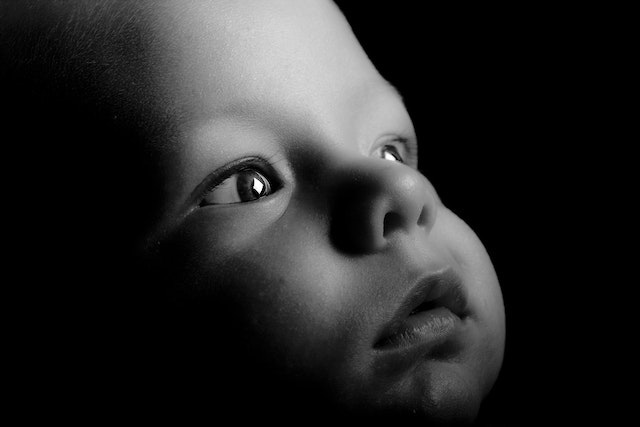Newborns are a source of wonder and amazement for many parents. As they grow and develop, parents eagerly anticipate the milestones that their babies will reach. One of the most exciting moments is when a newborn starts to smile and make eye contact.
However, it can be concerning when a baby’s eyes start to roll or move in unusual ways. In this article, we will explore the topic of newborn eye rolling and smiling.
Understanding Newborn Eye Rolling and Smiling
Newborns have a limited range of vision at birth, but they quickly begin to develop their visual skills. Eye rolling is a common occurrence in newborns, and it is usually nothing to worry about. Babies may roll their eyes when they are tired or when they are trying to focus on something.
Smiling is also an important developmental milestone that occurs in the first few months of life. Babies may smile in response to stimuli or as a way to communicate with their caregivers.
Key Takeaways
- Newborns may roll their eyes as a normal part of development.
- Smiling is an important milestone that occurs in the first few months of life.
- If a baby’s eye movements seem abnormal or are accompanied by other symptoms, parents should consult a doctor.
Understanding Newborn Eye Rolling and Smiling

Newborns have limited control over their eye movements, which can often lead to eye rolling. Eye rolling is a normal part of a baby’s development and is not usually a cause for concern. It is a reflexive response to stimuli, and it can occur when a baby is tired, overstimulated, or simply exploring their environment.
Normal eye movements in babies include eye rolling, blinking, and tracking. Blinking helps to keep the eyes moist and free of debris, while tracking helps babies follow moving objects and people. Eye rolling, on the other hand, is an involuntary movement that can occur when a baby is startled or surprised.
Abnormal eye rolling, however, can be a sign of a more serious condition, such as a seizure disorder. If a baby’s eye rolling is accompanied by other symptoms, such as a loss of consciousness or muscle stiffness, it is important to seek medical attention immediately.
Smiling is another important part of a baby’s development. Babies can begin to smile as early as six weeks old, and it is a sign that they are beginning to recognize and respond to their environment. Smiling is a social behavior that helps to strengthen the bond between a baby and their caregiver.
In conclusion, newborn eye rolling is a normal part of a baby’s development and is not usually a cause for concern. However, abnormal eye rolling can be a sign of a more serious condition and should be evaluated by a medical professional.
Smiling is an important social behavior that helps to strengthen the bond between a baby and their caregiver.
Normal Vs. Abnormal Eye Movements
1. Normal Eye Movements
Newborns have limited control over their eye movements, and their eyes may appear to be wandering or rolling. This is normal and is due to the immaturity of the visual system. Newborns also have a tendency to focus on high-contrast stimuli, such as faces or bright objects.
As the visual system matures, newborns begin to track objects with their eyes and develop better control over their eye movements. By around 2-3 months of age, most infants are able to track moving objects smoothly and accurately.
2. Abnormal Eye Movements
Abnormal eye movements in newborns can be a sign of a neurological or visual problem. Some abnormal eye movements that may be cause for concern include:
- Jerky eye movements
- Eyes that are crossed or do not move together
- Eyes that are constantly rolled back or to one side
If a newborn exhibits any of these abnormal eye movements, it is important to consult a pediatrician or ophthalmologist for further evaluation.
In some cases, abnormal eye movements may be a symptom of a more serious condition, such as a brain injury or a visual impairment. Early detection and treatment can be crucial in preventing long-term complications.
Overall, while some degree of eye rolling or wandering is normal in newborns, it is important to be aware of any abnormal eye movements and seek medical attention if necessary.
Potential Causes of Abnormal Eye Movements

Abnormal eye movements in newborns can be caused by various factors, ranging from minor issues to serious medical conditions. Here are some potential causes of abnormal eye movements:
1. Seizures and Epilepsy
Seizures and epilepsy can cause abnormal eye movements in newborns. During a seizure, the baby’s eyes may roll or flutter, and they may also experience jerky eye movements. Epilepsy can also cause nystagmus, which is a condition where the eyes move rapidly and uncontrollably.
2. Nystagmus
Nystagmus is a condition where the eyes move rapidly and uncontrollably. It can be caused by a variety of factors, including neurological disorders, head injuries, and certain medications. Nystagmus can also be a symptom of other underlying conditions, such as cerebral palsy or Leber’s congenital amaurosis.
3. Strabismus
Strabismus is a condition where the eyes are not aligned properly. It can cause abnormal eye movements, such as eye rolling or fluttering. Strabismus can be caused by a variety of factors, including neurological disorders, head injuries, and certain medications.
4. Cataract
Cataract is a condition where the lens of the eye becomes cloudy, which can cause abnormal eye movements. It can be caused by a variety of factors, including genetics, infection, and injury.
5. Cerebral Palsy
Cerebral palsy is a group of neurological disorders that can cause abnormal muscle tone and movement, including abnormal eye movements. It can be caused by a variety of factors, including brain damage during pregnancy or childbirth.
6. Head Injuries
Head injuries, such as a concussion or traumatic brain injury, can cause abnormal eye movements in newborns. Depending on the severity of the injury, the eye movements may be temporary or permanent.
7. Stroke
A stroke can cause damage to the brain, which can result in abnormal eye movements in newborns. Depending on the location and severity of the stroke, the eye movements may be temporary or permanent.
8. Trauma
Trauma, such as a difficult delivery or physical injury, can cause abnormal eye movements in newborns. Depending on the severity of the trauma, the eye movements may be temporary or permanent.
9. Low Blood Sugar
Low blood sugar, also known as hypoglycemia, can cause abnormal eye movements in newborns. It can be caused by a variety of factors, including premature birth, maternal diabetes, and certain medications.
10. Neurological Disorders
Various neurological disorders can cause abnormal eye movements in newborns, including cerebral palsy, epilepsy, and Leber’s congenital amaurosis. These conditions can be caused by a variety of factors, including genetics, infection, and injury.
11. Leber’s Congenital Amaurosis
Leber’s congenital amaurosis is a rare genetic disorder that can cause abnormal eye movements in newborns. It can also cause other vision problems, such as vision loss and sensitivity to light.
Symptoms and Warning Signs

Newborns are constantly developing and exploring their surroundings. One of the ways they communicate is through their facial expressions. Eye rolling and smiling are common behaviors that parents may notice in their newborns.
However, it is important to understand when these behaviors may indicate something more serious.
1. Eye Rolling
Eye rolling in newborns is a common behavior that can occur for various reasons. It may be a sign of a neurological condition, such as a seizure disorder, or simply a normal part of a baby’s development. In most cases, eye rolling is not a cause for concern and will resolve on its own.
However, parents should be aware of certain warning signs that may indicate a more serious issue. If eye rolling is accompanied by other symptoms such as stiffening of the body or difficulty breathing, parents should seek medical attention immediately.
2. Smiling
Smiling is a natural and important part of a baby’s development. It is a way for them to communicate their happiness and contentment with their surroundings. However, not all smiles are created equal.
Parents should be aware of the different types of smiles that their newborns may display. A genuine smile, also known as a social smile, is a sign of healthy development. It typically occurs between 6 and 8 weeks of age and is accompanied by eye contact and other positive behaviors.
On the other hand, a smile that is not accompanied by other positive behaviors may be a sign of discomfort or distress. Parents should pay attention to their baby’s body language and other cues to determine the cause of the smile.
In conclusion, eye rolling and smiling are common behaviors in newborns. While they are usually harmless, parents should be aware of the warning signs that may indicate a more serious issue. By paying attention to their baby’s body language and seeking medical attention when necessary, parents can ensure their baby’s healthy development.
When to Consult a Doctor
While newborn eye rolling and smiling are typically normal developmental milestones, there are some cases where it may be necessary to consult a doctor. Here are some situations where parents should consider seeking medical advice:
1. Prolonged or Excessive Eye Rolling
If a newborn is constantly rolling their eyes or doing it excessively, it may be a sign of a medical issue. Parents should consult their pediatrician if they notice this behavior, especially if it is accompanied by other symptoms such as lethargy or lack of appetite.
2. Absence of Smiling
If a newborn is not smiling by the age of two months, it may be a cause for concern. Parents should consult their healthcare provider to rule out any underlying issues.
3. Asymmetrical Facial Expressions
If a newborn is displaying asymmetrical facial expressions, such as only smiling on one side of their face, it may be a sign of nerve damage or other medical issues. Parents should consult their pediatrician if they notice this behavior.
4. Lack of Eye Contact
If a newborn is not making eye contact by the age of six weeks, it may be a sign of a developmental issue. Parents should consult their healthcare provider to rule out any underlying issues.
Overall, parents should trust their instincts and consult a doctor if they are concerned about their newborn’s eye rolling or smiling behaviors. A healthcare provider can help determine if there is an underlying medical issue or if the behavior is within the range of normal development.
Diagnosis and Treatment
1. Diagnosis
Newborn eye rolling and smiling can be a normal part of development, but in some cases, it can indicate an underlying medical condition. If a parent or caregiver notices excessive eye rolling or smiling, they should speak with their pediatrician.
The pediatrician may refer the child to an ophthalmologist or a neurologist for further evaluation.
The doctor may perform a physical exam and ask questions about the child’s development and medical history. They may also order diagnostic tests, such as an electroencephalogram (EEG), to check for abnormal brain activity that could be causing the eye rolling or smiling.
In some cases, eye rolling and smiling can be a symptom of infantile spasms or West syndrome, which are types of seizures that typically occur in infants under the age of one. These conditions require prompt medical attention and treatment.
2. Treatment
The treatment for newborn eye rolling and smiling depends on the underlying cause. If it is determined that the eye rolling and smiling are a normal part of development, no treatment may be necessary.
If a medical condition is causing the eye rolling and smiling, the doctor may recommend medication or surgery. For example, if the child has a “lazy eye,” they may need to wear an eye patch or undergo surgery to correct the problem.
If the eye rolling and smiling are caused by infantile spasms or West syndrome, the child may need to take medication to control the seizures. In some cases, surgery may be necessary to remove the part of the brain causing the seizures.
It is important for parents and caregivers to follow the doctor’s recommendations for treatment and to attend all follow-up appointments. With appropriate treatment, many children with newborn eye rolling and smiling can go on to develop normally.
Prevention and Care
Newborn eye rolling and smiling are natural developmental milestones that occur during the first few months of life. While these behaviors are typically harmless, there are some steps that parents can take to prevent any potential issues and ensure proper care for their baby’s eyes.
1. Birth and Vision
At birth, a baby’s vision is not fully developed, and they can only see objects that are about 8-10 inches away. As their vision develops, they will begin to focus on objects further away and develop depth perception.
It is important to provide your baby with visual stimulation by placing toys and objects at different distances and angles.
2. Sleep and Feeding
Newborns sleep a lot, and it is important to ensure that they are sleeping in a safe environment. Avoid placing toys or objects in their crib that could potentially obstruct their vision or cause injury. During feeding, make sure that your baby’s eyes are not exposed to bright lights or direct sunlight, as this can be uncomfortable and potentially harmful.
3. Developmental Milestones
Newborn eye rolling and smiling are important developmental milestones that occur during the first few months of life. These behaviors are a sign that your baby is developing properly and responding to their environment.
It is important to give your baby plenty of opportunities to practice these skills by providing visual stimulation and engaging in face-to-face communication.
4. Eye Care
Regular eye exams are an important part of your baby’s overall health care. If you notice any unusual eye movements or behaviors, such as eye rolling or nystagmus (involuntary eye movements), it is important to consult with your pediatrician. They may recommend further testing or referral to a specialist.
Related: Why Does My Newborn Roll His Eyes Back When Sleeping
Frequently Asked Questions
What causes newborns to roll their eyes?
Newborns may roll their eyes for various reasons, including normal development, tiredness, or a medical condition. In the first few months of life, babies are still learning how to control their eye movements, and it is common for them to roll their eyes or look cross-eyed.
However, if your newborn is consistently rolling their eyes, it is recommended to consult with a pediatrician to rule out any underlying medical conditions.
How can I tell if my newborn is happy?
Newborns may show signs of happiness through smiling, cooing, or making eye contact. While it is important to note that newborns may also smile or make noises in their sleep, these behaviors are still positive signs of development. As babies grow, they will also begin to show more complex emotions and behaviors.
What are some common eye movements in newborns?
Newborns may exhibit a variety of eye movements, including rolling, crossing, and jerking. These movements are typically normal and are a part of the baby’s development. However, if your newborn’s eye movements seem excessive or unusual, it is recommended to consult with a pediatrician.
When should I be concerned about my newborn’s eye movements?
If your newborn’s eye movements seem excessive, unusual, or are accompanied by other symptoms such as vomiting or lethargy, it is recommended to consult with a pediatrician. Some medical conditions, such as seizures or neurological disorders, may cause abnormal eye movements in newborns.
What can cause jerky eye movements in newborns?
Jerky eye movements in newborns may be caused by a variety of factors, including normal development, tiredness, or a medical condition. In some cases, jerky eye movements may be a sign of a neurological disorder or other medical condition, and it is recommended to consult with a pediatrician if you are concerned.
Is it normal for a newborn’s eyes to twitch or roll back?
Newborns may exhibit a variety of eye movements, including twitching or rolling back. While these movements are typically normal and a part of the baby’s development, it is important to consult with a pediatrician if you are concerned or if the movements seem excessive or unusual.

Iesha is a loving mother of 2 beautiful children. She’s an active parent who enjoys indoor and outdoor adventures with her family. Her mission is to share practical and realistic parenting advice to help the parenting community becoming stronger.
